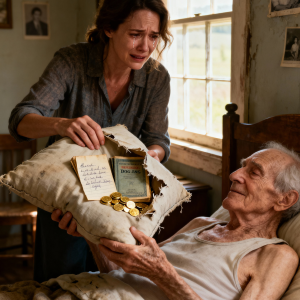
When Adrian and I returned from our honeymoon in Portugal, sun-kissed and still carrying the glow of our wedding week, we were met with something that stopped us cold.
A massive green dumpster squatted in the middle of our backyard in Brighton, brimming with shredded wrapping paper, collapsed boxes, and torn ribbons. At first, I thought perhaps a contractor had delivered it by mistake, or that a neighbor’s renovation had spilled into our garden.
But then we stepped inside the house. Every wedding gift we had received gone.
Only two “His & Hers” mugs sat abandoned on the table, next to the wilted petals from the bouquet my niece had scattered down the aisle.
And on the counter, in curly handwriting that somehow looked triumphant, was a single line:
“I’ve taken your wedding presents as compensation for caring for your home.” It was his mother, Helena.
Just a week earlier, we had married under fairy lights strung across the old oak trees in our yard. We didn’t have a lavish budget, but our friends and family had showered us with love—an heirloom clock from my grandfather, a set of crystal glasses friends had pooled money for, a stand mixer from Adrian’s colleagues, and the handmade quilt my late grandmother had left me.

The morning after the wedding, Adrian had given his mother a spare key. “She’ll water the plants while we’re gone,” he said, and Helena had smiled, promising to “take good care of everything.”
We thought nothing of it. Now, standing in a stripped living room, I realized that smile had been a mask.
When Adrian called her, Helena answered brightly. “Oh, I tidied up for you! I kept a few things too—as thanks for raising Adrian all these years, and for keeping your ferns alive.”
Her definition of “a few things” turned out to be nearly everything. The espresso machine from my uncle, the cash envelope from my parents, the crystal, the quilt.
“You can’t just help yourself,” Adrian said, his voice tight.
“I can, and I have,” she replied coolly. “Don’t be greedy. I worked harder than either of you ever have. Those gifts are mine by right. A mother sacrifices for decades. You’ll get plenty more in your life.”
My chest burned. It wasn’t about money—it was about her reducing the meaning behind every gift to a tally for her own ego.
Driving to her house to confront her, I remembered Christmas the year before. Adrian had given me a gold necklace shaped like a rose. I’d just opened the box when Helena snatched it from my hands, held it up to her throat, and said with a sly smile, “Well, since I raised him, what he buys is really mine, isn’t it?” She’d laughed it off as a joke, but the weight in my stomach told me it wasn’t.
That day had been a warning I hadn’t wanted to see.
When we arrived, Helena stood at the door with her arms folded, chin lifted as if she were a queen on her throne.
“Those gifts were for the family, and I’m the head of this family,” she declared. “I decide where they belong. If you didn’t want me involved, you shouldn’t have given me a key.”

We left before it became a shouting match. Back home, silence hung between us until Adrian finally said, “We could sue her in small claims court… but it’ll be ugly.”
I shook my head slowly. “She doesn’t just hoard. She loves to boast. She’ll show off what she’s taken.”
And that gave us the idea.
The following weekend, Adrian invited her to a barbecue. “Just family, nothing fancy,” he said sweetly on the phone. Helena lit up. “Oh, I’ll bring the espresso machine! Everyone must try it.”
We positioned my phone discreetly in the kitchen, recording the moment she inevitably began her performance. Sure enough, she paraded in, flaunting the wine glasses, bragging about the mixer she’d “whipped up the fluffiest cake with,” and even draping my grandmother’s quilt across her lap while sipping coffee.
Every word was captured.
The next morning, Adrian and I created a private Facebook group for our wedding guests—and, crucially, a handful of Helena’s closest friends. We posted the video with a simple caption:
“Thank you all for your thoughtful gifts. Unfortunately, Adrian’s mother decided to keep many of them for herself as ‘payment.’ Here she is, in her own words. If you’d like your gift returned, please contact her directly.”
We hesitated for a moment before hitting “post,” but then I remembered the empty living room and the smug curl of her handwriting.
Within an hour, our phones exploded. Friends and relatives were outraged. Some demanded their gifts back immediately. Even Helena’s own friends commented in disbelief.
By evening, Helena’s voice cracked over the phone to Adrian. “Take it down, please. I can’t bear the messages. Everyone’s calling me a thief.”

“You’ll get it removed,” Adrian said evenly, “the moment every single gift is back in our home. Not before. And you’ll never have a key again.”
Silence. Then a resigned, “Fine.”
By week’s end, the gifts were returned—some still untouched in their packaging. She hadn’t needed them; she’d only wanted to hold them, to show them off.
Adrian and I didn’t invite her over to watch us unwrap them again. Instead, one evening we spread a blanket on the floor, ordered takeaway, and opened each box together, FaceTiming the givers to thank them properly.
It felt like reclaiming not just the gifts, but the joy she’d tried to strip from us.
Helena is now on what Adrian calls a “long suspension.” He told her firmly, “You’re my mother, but you won’t sabotage my marriage. Until you respect that, you’re not welcome in our home.”
And as strange as it sounds, I realized the turning point of our marriage wasn’t the vows, or the honeymoon, or even the night we got the gifts back. It was that hideous green dumpster—her vanity and our proof—that turned her betrayal into our victory.



